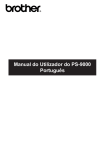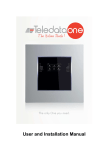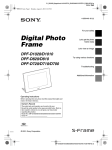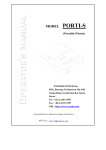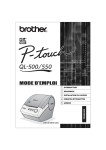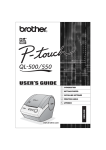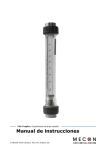Download Brother PS9000 User`s manual
Transcript
PS-9000 User’s Manual UK English Introduction Thank you for purchasing PS-9000 print server. This manual provides complete information on how to set up and use PS-9000 safely. Please read this manual carefully before using the product. PS-9000 print server provides small-scale network connectivity for your PS-9000-compatible P-touch printers. PS-9000 is compatible with the print monitor of the P-touch printer drivers. You can check the status (tape end, tape width, errors, etc.) of P-touch machines that are connected to the network in real time from your computer. ■ PS-9000 Supported Protocol: TCP/IP Supported OS: Microsoft® Windows® 95/98/98SE/Me, Microsoft® Windows NT® 4.0, Microsoft® Windows® 2000 Pro, Microsoft® Windows® XP *Please note that the supported printer OS differ per model. 10BASE-T/100BASE-TX (auto-detect) USB interface port ■ About this Manual Copying all or any part of this manual without permission is strictly prohibited. The contents of this manual may be changed without advance notice. If you have any questions about this manual or our products, please contact Brother customer support. Extreme care has been taken to check this manual for errors and omissions; however, we take no responsibility for any mistakes included in this manual or any damages, direct or indirect, arising from the use of this manual. P-touch is a registered trademark of Brother Industries, Ltd. in the U.S. and other countries. Microsoft®, Windows®, Windows NT®, etc. are registered trademarks of Microsoft Corporation in the U.S. and other countries. Other brand or product names are registered trademarks or trademarks of their respective companies. ■ Conventions This manual uses the following symbols to point out specific information that should always be well observed. In addition, refer to the precautions described in “Safety Instructions” for details on safe and correct operation. Caution ● This type of notation indicates important information that must be observed when operating the product. Be sure to read this information for safe and proper use. Note ● This type of notation indicates useful information that is helpful during operation. If you experience difficulties operating the product, refer to this information first. 1 Table of Contents Introduction ......................................................................................................................1 Safety Instructions .............................................................................................................4 1 About PS-9000 ......................................................................................... 5 About PS-9000 ..................................................................................................................6 Compatible models ..........................................................................................................................6 Parts and Functions ...........................................................................................................7 Top ..................................................................................................................................................7 Bottom .............................................................................................................................................7 Back .................................................................................................................................................8 Right side .........................................................................................................................................8 Connection to the Network ...............................................................................................9 Specifications ..................................................................................................................11 Hardware specifications .................................................................................................................11 Software specifications ...................................................................................................................11 Operation requirements ..................................................................................................................11 2 Using the PS-9000 in a Windows® Environment ................................... 12 Starting the Brother PS-9000 Utility ................................................................................13 How to Set Up the PS-9000 .............................................................................................14 PS-9000 Setup Method 1 ...............................................................................................15 “Install this unit and the utility.” -Using the TCP/IP protocol .............................................................................................................15 PS-9000 Setup Method 2 ...............................................................................................19 “Install the utility.” -Install the printing client software ..................................................................................................19 Other Functions ..............................................................................................................22 Automatic IP address configuration with DHCP/BOOTP ................................................................22 Automatic IP address configuration with RARP ...............................................................................22 Uninstalling the Software ................................................................................................23 Using the PS-9000 With a Different P-touch ...................................................................23 3 Questions & Answers ............................................................................. 27 XUsing the Web Browser ................................................................................................25 Display the PS-9000 Web page ......................................................................................................25 Manage PS-9000 Via the Web Page .................................................................................26 4 Questions & Answers ............................................................................. 27 Questions & Answers ......................................................................................................28 Troubleshooting ..............................................................................................................30 2 5 Appendix ............................................................................................... 32 LPR Printing in Microsoft® Windows NT® 4.0, Microsoft® Windows® 2000 Pro and Microsoft® Windows® XP ................................................................................................33 Print using an LPR port in Microsoft® Windows NT® 4.0 (PT-9500PC only) ...........................................................................................................................33 Print using an LPR port in Microsoft® Windows® 2000 Pro ............................................................35 Print using an LPR port in Microsoft® Windows® XP ......................................................................38 PS-9000 Settings ..............................................................................................................41 3 Safety Instructions To ensure safe and proper use, please read the following information carefully before starting to use this product. These safety instructions include important information on the safe handling of the product and on general safety issues for the user. ■ Do not subject the machines to impact. If the P-touch or this unit is subjected to an impact and is damaged, unplug it from the electrical outlet, and then contact Brother Customer Service. If you continue to operate a damaged machine, fire or an electric shock may result. ■ Keep the cords and cables connected to this unit out of the reach of children, otherwise an electric shock or injuries may result. ■ Before disconnecting this unit, be sure to first unplug the P-touch machines and this unit from the electrical outlet. ■ Do not disassemble or alter this product in any way. ■ Do not use this unit with the cover removed, otherwise an electric shock may occur. ■ Do not try to service, adjust or repair this unit, otherwise an electric shock may occur. Contact Brother Customer Service to request servicing, adjustments or repairs for this unit. ■ Stop using this unit if it does not operate correctly (for example, if it becomes unusually hot or produces smoke or an unusual odour), otherwise fire, an electric shock or damage may result. Immediately turn off the P-touch, unplug the AC adapter from this unit, unplug the AC adapter from the electrical outlet, and then contact Brother Customer Service for service or repairs. ■ If any foreign objects (such as metal or liquids) enter the unit, immediately turn off the P-touch, unplug the AC adapter from this unit, unplug the AC adapter from the electrical outlet, and then contact Brother Customer Service for service or repairs. Continuing to use the unit may result in fire or an electric shock. 4 1 About PS-9000 About PS-9000 ................................................................................................6 Parts and Functions .........................................................................................7 Connection to the Network.............................................................................9 Specifications ................................................................................................11 About PS-9000 PS-9000 is a USB print server for P-touch/QL on a 10BASE-T/100BASE-TX network environment. PS9000 is compatible with the print monitors of P-touch printer drivers and enables you to visually check the status of print jobs and P-touch/QL. Compatible models ■ QL-500 ■ QL-550 ■ QL-650TD ■ QL-1050 ■ QL-1050N ■ PT-9500PC ■ PT-9200DX The appropriate P-touch driver compatible with the PS-9000 must be installed. From the dialog box that appears when the CD-ROM included with the PS-9000 is inserted into the drive, click [P-touch Driver], install the network driver for your P-touch, and then begin the setup. ■ Declaration of Conformity We, Brother Industries, Ltd. 15-1 Naeshiro-cho, Mizuho-ku, Nagoya 467-8561 Japan declare that this product conforms with the following normative documents: Safety: EN 60950 (AC adapter) EMC: EN 55022 1998 Class B EN 55024 1998 EN 61000-3-2 1995 EN 61000-3-3 1995 following the provisions of the Electromagnetic Compatibility Directive 89/336/EEC (as amended by 91/263/EEC and 91/31/EEC). This system also follows the provisions of the Low Voltage Directive 73/23/EEC. Issued by: Brother Industries Ltd. Note: Marking is in compliance with EU Directive 2002/96/EC and EN50419. This equipment is marked with the above recycling symbol. It means that at the end of the life of the equipment you must dispose of it separately at an appropriate collection point and not place it in the normal domestic unsorted waste stream. This will benefit the environment for all. (European Union only) 6 Parts and Functions Top 10BASE LINK LED (Green) Bottom 100BASE LINK LED (Green) STATUS LED (Orange) You can check the LED on the board. ■ 10BASE LINK LED (Green) Lights when a 10BASE-T network connection is established. ■ 100BASE LINK LED (Green) Lights when a 100BASE-TX network connection is established. ■ STATUS LED (Orange) Flashes during data transfer. Ethernet Address (The last 6 digits are the product’s serial number.) ■ Ethernet Address The Ethernet Address of the device. The last 6 digits are the product’s serial number. Note ● Ethernet address 00:80:77:50:00: 01 is noted as 008077500001. The product’s number (serial number) is 500001. 7 Back Right side Power Connector LAN USB Network Port (10BASE-T/100BASE-TX) Push Button DC5V IN USB Port ■ Network Port (10BASE-T/100BASE-TX) Connection for the network cable. *In 100BASE-TX environment, use category 5. ■ Push Button Press this button to reset PS-9000 to its factory default settings. ■ USB Port Connection for the USB cable. ■ Power Connector Connection for the AC adapter. ■ Factory Default Settings 1 Make sure that the AC adapter is not connected to the PS-9000. While pressing the push button, connect the AC adapter to the PS-9000. The STATUS LED 2 (orange) will blink once when the connection is made. Continue to press the push button for two seconds. The STATUS LED will blink again when the 3 settings are successfully reset to the factory default settings. Release the push button. Caution ● Do not turn off the PS-9000 while it is being initialized to the factory default settings. ● When the PS-9000 is turned on again after being initialized to the factory default settings, do not press the push button. ● The PS-9000 can be initialized to its factory default settings from the Brother PS-9000 Utility. 8 Connection to the Network Caution ● If you have already used the PS-9000 on another network or if it had been connected to other P-touch units, initialize the PS-9000 to its factory default settings. You can initialize PS-9000 from Brother PS-9000 Utility. ● The PS-9000 cannot be used with a USB hub. ● If you are using the PS-9000 in a 100BASE-TX environment, prepare a 100BASE-TX Ethernet hub and network cable (Category 5). ■ Prepare the following items. Ethernet HUB Network Cable USB Cable 9 Use the network cable to connect the 1 PS-9000 to the Ethernet hub. Connect the AC adapter to the PS-9000, 2 and then plug the power cable of the P-touch and PS-9000 into the electrical outlet. Use the USB cable to connect the 3 PS-9000 to the P-touch. (PS-9000: Type A connector; P-touch: Type B connector) Note ● The USB cable has two different types of connectors. Be sure to insert the correct type of connector into the correct port. 4 Turn on the P-touch. Caution ● Using an AC adapter other than the one supplied with PS-9000 may result in damage. ● Do not connect devices other than a P-touch to the PS-9000 USB port. ● Wait more than 2 seconds between connecting and disconnecting the USB cable. ● Do not disconnect the USB cable while printing. ■ USB Cable Connectors Type A Type B P-touch Ethernet HUB PS-9000 Note ● The shape of the power cord depends on your model. 10 Specifications Hardware specifications ■ CPU 32bit RISC CPU ■ Memory RAM: 8 MBytes Flash ROM: 1 MByte ■ Network Interface 10BASE-T/100BASE-TX 1 port (automatic detection) ■ USB Interface A Port ■ Others Push Button: 1 button LED Indicators: 3 LEDs, one for Status (orange), one for 10BASE Link (green), and one for 100BASE Link (green) Operation requirements ■ Network Environment Microsoft® Windows® 95/98/98SE/Me, Microsoft® Windows NT® 4.0, Microsoft® Windows® 2000 Pro, Microsoft® Windows® XP *Please note that the supported printer OS differ per model. ■ Operating Environment Temperature: 5 °C to 35 °C Humidity: 20% to 80% RH (no condensation allowed) ■ Storage Environment Temperature: -10 °C to 50 °C Humidity: 20% to 90% RH (no condensation allowed) Software specifications ■ Supported Protocol TCP/IP ■ TCP/IP Network Layer: ARP, RARP, ICMP, IP Session Layer: TCP, UDP Application Layer: LPR, FTP, BOOTP, HTTP, DHCP IP address can be set with Setup Utility. 11 2 Using the PS-9000 in a Windows® Environment Starting the Brother PS-9000 Utility..............................................................13 How to Set Up the PS-9000 ..........................................................................14 PS-9000 Setup Method 1 .............................................................................15 PS-9000 Setup Method 2 .............................................................................19 Other Functions ............................................................................................22 Uninstalling the Software..............................................................................23 Using the PS-9000 With a Different P-touch.................................................23 Starting the Brother PS-9000 Utility Insert the CD-ROM included with the PS-9000 into the CD-ROM drive of your computer. The main menu dialog box will automatically appear. After the CD-ROM is inserted into the CD-ROM drive of the computer, the main menu dialog 1 box automatically appears. ● If the main menu dialog box does not appear, open My Computer, select the CD-ROM drive, and then run “autorun.exe“. ■ Readme Click [Readme] for important information on the Brother PS-9000 Utility. Make sure to read this information carefully before starting to use the PS-9000. ■ Setup The installation wizard will be started. This leads you through the setup of the PS-9000 for printing. ■ User’s Guide Click [User’s Guide] to access the on-line manual. Adobe® Acrobat Reader® must be installed in order to view the manual. 13 How to Set Up the PS-9000 Caution ● When setting up the PS-9000 on an operating system that has administrator privileges (such as, Microsoft® Windows NT® 4.0, Microsoft® Windows® 2000 Pro or Microsoft® Windows® XP), be sure to log in with a user account that has administrator privileges. There are two setup methods available with the Brother PS-9000 Utility. “Installs this unit and the utility.” 1 With this method, the PS-9000 print server settings are specified and the software for printing on a network is installed onto the computer. Select this method if the PS-9000 is being used for the first time after it was purchased or after its settings were reset to the factory default settings. “Installs the utility.” 2 With this method, only the software for printing on a network is installed onto computers. Select this setup method if the PS-9000 is already set up and the software is being installed onto the second or more computer. Caution ● Install the printing software onto all computers that will use the P-touch connected to the PS-9000. Software License ● Use the software according to the license agreement that appears during installation. ● Install the software onto multiple computers at a single location and use it to print from the P-touch connected to the PS-9000. 14 PS-9000 Setup Method 1 The setup wizard is very easy. Caution ● Before specifying settings, be sure to install the P-touch printer driver. (From the dialog box that appears when the CD-ROM included with the PS-9000 is inserted into the drive, click [P-touch Driver], and then install the network driver for your P-touch. ● Before starting the setup, make sure to quit all application programs that are running. “Install this unit and the utility.” -Using the TCP/IP protocol This method sets up the PS-9000 and the printing software. Choose this setup mode when you are using the PS-9000 for the first time and the product is still set to its factory default settings. In the main menu dialog box, click 1 [Setup]. The welcome message shown Select “Installs this unit and the utility.”, 3 and then click [Next]. below appears. Click [Next]. Read the Software License Agreement, 2 and then click [Yes] if you agree. 15 Select the PS-9000 to be set up, and then 4 click [Next]. Specify the IP address. 5 • If “Assign an IP address” is selected (recommended) →In the following dialog box that appears, type in the IP address, subnet mask and default gateway. Consult your network administrator for the appropriate settings. • If the product is not displayed in the list, click [Search]. • Alternatively, you can type in the Ethernet address of the product that you want to set up. • If you want to reset the product to its factory default settings, click [Initialize] and follow the instructions. • If “Obtain an IP address automatically” is selected →In an environment with a DHCP/ BOOTP server, the IP address of the PS-9000 is automatically assigned. Caution ● After setup, the IP address may change when the unit is turned off, then turned on again. In that case, the PS-9000 must be set again and the printing software must be reinstalled. 16 The selected configuration is displayed 6 for you to check it. If the configuration is correct, click [Execute] to apply it. The settings are sent to the PS-9000. The Brother PS-9000 Utility is installed. 7 Click [Next] if you do not want to change the destination directory. Specify the group name that will appear 8 in the Start menu. The default group name is “Brother PS-9000 Utility”. After specifying the group name, click [Next]. • If you change the name, make sure that the group name you specify is not used already. Select if you want to set up the printer 9 port. • The screen shown below appears if the Brother PS-9000 Utility has already been installed on your computer. Select if you want to overwrite the software, and then click [Next]. If you selected “Yes”, continue with the operation described above. If you selected “No”, continue with step 10. Select “Yes”, and then click [Next]. 17 Select the P-touch to be set up, and then 0 click [Next]. • If there are no compatible P-touch units, click [Cancel] to quit this setup wizard, install a P-touch printer driver, and then repeat the setup procedure for the PS-9000 from the beginning. Type in the printer port name, and then c click [Next]. • When you assign the printer port name, make sure that the port name you specify is not used already (e.g., LPT1:). • The default port name is “PTLANxxxxxx:” (where “xxxxxx” is the last six digits of the Ethernet address). After the setup preparations are a finished, click [Next]. The setup configuration is displayed. d Click [Finish]. Select the PS-9000, which is to be set b up, and then click [Next]. • If the product to be set up is not displayed in the list, click [Search]. • If you click [Search Option], the TCP/IP broadcast address can be configured. 18 When setup is complete, the dialog box e shown below appears. Click [Finish]. PS-9000 Setup Method 2 The setup wizard is very easy. Caution ● Before specifying settings, be sure to install the P-touch printer driver. (From the dialog box that appears when the CD-ROM included with the PS-9000 is inserted into the drive, click [P-touch Driver], and then install the network driver for your P-touch. ● Before starting the setup, make sure to quit all application programs that are running. “Install the utility.” -Install the printing client software This method sets up only the Brother PS-9000 Utility. Choose this setup method when the PS-9000 has already been set up in the environment. In the main menu dialog box, click 1 [Setup]. The welcome message shown Select “Installs the utility.”, and then 3 click [Next]. below appears. Click [Next]. Read the Software License Agreement, 2 and then click [Yes] if you agree. 19 The Brother PS-9000 Utility is installed. 4 Click [Next] if you do not want to change Select if you want to set up the printer 6 port. the destination directory. Select “Yes”, and then click [Next]. • The screen shown below appears if the Brother PS-9000 Utility has already been installed on your computer. Select if you want to overwrite the software, and then click [Next]. If you selected “Yes”, continue with the operation described above. If you selected “No”, continue with step 7. Select the P-touch to be set up, and then 7 click [Next]. • If there are no compatible P-touch units, click [Cancel] to quit this setup wizard, install a P-touch printer driver, and then repeat the setup procedure for the PS-9000 from the beginning. Specify the group name that will appear 5 in the Start menu. The default group name is “Brother PS-9000 Utility”. After specifying the group name, click [Next]. • If you change the name, make sure that the group name you specify is not used already. 20 After the setup preparations are finished, 8 click [Next]. Select the PS-9000, which is to be set up, 9 and then click [Next]. • If the product is not displayed in the list, click [Search]. • If you click [Search Option], the TCP/IP broadcast address can be configured. The setup configuration is displayed. a Click [Finish]. When setup is complete, the dialog box b shown below appears. Click [Finish]. Type in the printer port name, and then 0 click [Next]. • When you assign the printer port name, make sure that the port name you specify is not used already (e.g., LPT1:). • The default port name is “PTLANxxxxxx:” (where “xxxxxx” is the last six digits of the Ethernet address). 21 Other Functions Other functions of the PS-9000 are as follows. Automatic IP address configuration with DHCP/ BOOTP PS-9000 supports the DHCP/BOOTP protocol. TCP/IP-related settings can be specified within the network where the DHCP/BOOTP server is operating. Caution ● PS-9000 supports DHCP/BOOTP protocols that are in accordance with RFC2131/2132. ● To use the DHCP/BOOTP function of the PS-9000, contact your network administrator. ● If the IP address obtained by the PS-9000 from a DHCP/BOOTP server is changed, printing will no longer be possible. We recommend using a fixed IP address for the PS-9000. 22 Automatic IP address configuration with RARP The PS-9000 supports RARP protocol. The IP address can be set within the network where the RARP server is operating. Caution ● To use the RARP function of the PS-9000, contact your network administrator. ● If the IP address obtained by the PS-9000 from a RARP server is changed, printing will no longer be possible. We recommend using a fixed IP address for the PS-9000. Uninstalling the Software If this product will no longer be used, remove (uninstall) the software. On the Start menu, point to “All 1 Programs”*, click “Brother PS-9000 Utility”, and then click . (*”Programs” on operating systems other than Windows XP.) - The Uninstaller dialog box appears. Using the PS-9000 With a Different P-touch When using PS-9000 with a different P-touch than the one that is currently connected, remove (uninstall) the Brother PS-9000 Utility from the computer, reset the PS-9000 to its factory default settings, and then perform the setup procedure from the beginning. Click [Yes]. 2 The software is uninstalled. Uninstall the Brother PS-9000 Utility. 1 (Refer to “Uninstalling the Software” in chapter 2, “Using the PS-9000 in a Windows® Environment”.) Reset the PS-9000 to its factory default 2 settings. (Refer to “Parts and Functions” in chapter 1, “About PS-9000”.) Set up the PS-9000. 3 (Refer to “PS-9000 Setup Method 1” in chapter 2, “Using the PS-9000 in a Windows® Environment”.) 23 3 Using the Web Browser Using the Web Browser ................................................................................25 Manage PS-9000 Via the Web Page ..............................................................26 Using the Web Browser This chapter provides a description of the procedure for using a Web browser to access the PS-9000 Web page. Using a Web browser, the various PS-9000 settings and the status of the PS-9000 and the P-touch can be checked. Display the PS-9000 Web page Type the IP address of the PS-9000 in the Web browser. 1 Example: If the IP address is 192.168.40.112, type “http://192.168.40.112/”. Note ● For the Web browser, we recommend Internet Explorer 4.01 SP2 (or higher) or Netscape Navigator 4.0 (or higher). If a different web browser is used, it must be compatible with HTTP 1.0 (RFC1945) and HTML 2.0 (RFC1866). ● The information may be different depending on the products. ● In order to use the Web browser, an IP address must be assigned to the PS-9000. 25 Manage PS-9000 Via the Web Page ■ Display Status The printer status and system information of the P-touch connected to the PS-9000 can be seen here. ■ Configuration Through the Web browser setup, you can configure the PS-9000 (general and TCP/IP settings) and restart the PS-9000. You must type in the user name (root) and password to change the configuration. We recommend that you change the password after setting up the PS-9000, so that only the network administrator can change the configuration. (As a factory default, “root” is specified as the user name, and no password is set.) (Printer status) (Configure PS-9000) (System information) (Restart PS-9000) • If a print job with an error that has occurred remains on the print server, the jobs can be deleted by restarting the PS-9000. 26 4 Questions & Answers Questions & Answers ....................................................................................28 Troubleshooting ............................................................................................30 Questions & Answers This chapter answers questions and offers solutions to problems that might arise when using the product. Symptom CD-ROM is inserted, but does not start automatically. PS-9000 is not found after searching during setup with the Brother PS-9000 Utility. Cause Remedy If your computer does not support Autorun, the main menu will not automatically appear after the CD-ROM is inserted. In this case, run “autorun.exe” in the root directory (D:\ if the CD-ROM is loaded in drive D of the computer) of the CD-ROM. Make sure that the LINK LED is blinking. If the LINK LED is not blinking, PS-9000 may not be properly connected to the network. Check for the following, and then initialize the PS-9000 to its factory default settings and set it up from the beginning. •Check if the PS-9000 is turned on. •Check if the network cable is inserted correctly to the PS-9000. •Check if the network cable is broken. •Check if the LINK LED of the PS-9000 and the Ethernet hub is blinking. •Check if the Ethernet hub is working properly. If communication is limited to TCP/ IP, the PS-9000 may not be found. If a personal firewall is activated, deactivate it. If TCP/IP filtering limitations are applied, remove them. Make sure that the LINK LED is blinking. If the LINK LED is not blinking, the PS-9000 may not be properly connected to the network. Check for the following, and then initialize the PS-9000 to its factory default settings and set it up from the beginning. •Check if the PS-9000 power is turned on. •Check if the network cable is inserted correctly to the PS-9000. •Check if the network cable is broken. •Check if the LINK LED of the PS-9000 and the Ethernet hub is blinking. •Check if the Ethernet hub is working properly. •Check if the PS-9000 and the P-touch are connected properly. •Check if the USB cable is connected properly. Reset the PS-9000 to its factory default settings and set it up again from the beginning. Example: When sending a ping in Windows® 98 MS-DOS Go to “Start” – “Programs” – “MS-DOS Prompt” and run “Ping xxx.xxx.xxx.xxx”. You will see the message below. “xxx.xxx.xxx.xxx” is the IP address of the PS-9000. The print job is not printed. If you are using the TCP/IP protocol, ping the PS-9000 with the set IP address to see if there is any reply. If there is no reply to pinging, the IP address may not be set properly. •When there is a reply to pinging: Reply from xxx.xxx.xxx.xxx:bytes=32 time=58ms TTL=253 Reply from xxx.xxx.xxx.xxx:bytes=32 time=58ms TTL=253 Reply from xxx.xxx.xxx.xxx:bytes=32 time=58ms TTL=253 Reply from xxx.xxx.xxx.xxx:bytes=32 time=58ms TTL=253 •When there is no reply to pinging: Request timed out. Request timed out. Request timed out. Request timed out. 28 Symptom The print job is not printed. Cause Remedy If a DHCP/BOOTP server or a RARP server resides on the network, the IP address is automatically issued by the server. In this case, the IP address that was manually set for the PS-9000 may have been overwritten by the server. Create a local environment where the server does not exist and issue the IP address to the PS-9000. At the same time, make sure that “Obtain an IP address automatically” in the TCP/IP setting is not marked. If the PS-9000 and the computer are not in the same segment, a subnet mask and gateway address must be set for the PS-9000. Use the Brother PS-9000 Utility to check whether the subnet mask and gateway address are correct. Check the printer port name of the PS-9000. The port name is indicated by “(PTLAN xxxxxx: P-touch TCP Port)” after the assigned port name. Dial-up starts when printing is performed. Depending on the operating system being used, the automatic dial-up setting may have been specified. When using PS-9000, cancel the setting for automatic dial-up or, if the automatic dial-up setting cannot be cancelled, click [Cancel] in the dialup dialog box to begin printing. An error occurs during printing. If the unit stopped operating because of a tape width error or no more tape in the cassette during another user’s print job, printing is not possible until the error is cancelled. After the other user’s print job is finished, try printing again. Otherwise, use the Web browser to restart the PS-9000, and then try printing again. LPR printing is not available with PS-9000. With some of the P-touch machines, LPR printing is not available. With the PT-9200DX, install the printing software for the PS-9000 onto each client, and use it instead of using LPR printing. The tape width cannot be detected by P-touch Editor 4 or Quick Editor. If PT-9500PC is connected to the PS-9000, the tape width detection function of P-touch Editor 4 and Quick Editor does not operate. (There is no tape width detection function with PT-9200DX.) Manually specify the tape width. Can the PS-9000 be initialized (reset to its factory default settings)? PS-9000 can be initialized (reset to its factory default settings) by using the Brother PS-9000 Utility. Select PS-9000 in the PS-9000 setting dialog box of the Brother PS-9000 Utility, and then click [Initialize]. Otherwise, the PS-9000 can be initialized by pressing the push button. For further information on how to initialize PS-9000 by pressing the push button, refer to “Parts and Functions” in chapter 1, “About PS-9000”. 29 Troubleshooting Network printing is not possible. Install the printer driver. Is the printer driver installed? Yes No No Is printing possible? Is printing possible if the P-touch is directly connected to the computer? No Yes Is other equipment on the network operating properly? Check the network environment that is being used. No Yes No Is printing possible? Yes * Do the LEDs on the print server indicate that it is operating correctly? No Yes Yes Was there a reply to “ping xxx.xxx.xxx.xxx” (where xxx.xxx.xxx.xxx is the IP address of PS-9000) at the command prompt? No Can PS-9000 be found when the utility is used? No Yes No Is printing possible? Yes There is a problem with the printer. Check the setup procedure for the printer. The problem has been corrected. There may be a problem with the print server. Consult a service representative. 30 Yes *For details on the LEDs, refer to “Parts and Functions” in chapter 1, “About PS-9000”. ■ 2 LINK LEDs (green) Lights when a proper LAN connection is established. With a 100BASE-TX–compatible machine, check which LED is lit to determine if the connected LAN interface is 10BASE-T or 100BASE-TX. ■ STATUS LED (orange) Flashes during data transfer. During data transfer, this LED flashes at irregular intervals. If the LEDs indicate that operations are not being performed correctly, connected equipment or cables connecting the PS-9000 to the computer running the setup utility are not set up correctly. (Check that the indicators for the power supply and connection on the hub or router indicate that they are operating correctly.) If they are not operating correctly, replace the power supply cables, connection cables or connected equipment, and then try performing the operation again. 31 5 Appendix Caution ● You need to have administrator privileges to set up PS-9000 in Microsoft® Windows NT® 4.0, Microsoft® Windows® 2000 Pro and Microsoft® Windows® XP. LPR Printing in Microsoft® Windows NT® 4.0, Microsoft® Windows® 2000 Pro and Microsoft® Windows® XP .......................................................................33 PS-9000 Settings............................................................................................41 LPR Printing in Microsoft® Windows NT® 4.0, Microsoft® Windows® 2000 Pro and Microsoft® Windows® XP This section explains how to setup and print with the PS-9000 using LPR in Microsoft® Windows NT® 4.0, Microsoft® Windows® 2000 Pro and Microsoft® Windows® XP. Note ● PT-9200DX doesn't support LPR printing. Print using an LPR port in Microsoft® Windows NT® 4.0 (PT-9500PC only) Note ● In order to print using LPR, an LPR port must be added. Go to “Start” – “Settings” – “Control Panel” – “Network”, and then select “Services”. Click [Add], select “Microsoft TCP/IP Printing”, and then click [OK]. The component is installed. Restart the computer. 1 Go to “Start” – “Settings” – “Printers”, and then double-click [Add Printer] to start up the wizard. 2 In the following dialog box that appears, select “My Computer”, and then click [Next]. • If you already created a port when you installed the PS-9000, select the port from the list, and then continue with step 6. 4 Select “LPR Port” from the “Available Printer Ports”, and then click [New Port]. 5 In the “Name or address of server 3 In the following dialog box that appears, click [Add Port], and then create a new port. providing lpd” box, type in the IP address that was set for the PS-9000. In the “Name of printer or print queue on that server” box, type in “lp”, and then click [OK]. 33 6 In the list of “Available Ports”, select the appropriate port, and then click [Next]. 0 In the Printer Sharing dialog box, select “Shared” or “Not shared” according to your environment. If the printer is shared, type a share name. Then, click [Next]. 7 In the Add Printer Wizard dialog box, select the P-touch printer driver to be used, and then click [Next]. a In the Print Test Page dialog box, select “No”, and then click [Finish]. When the new printer is added to the list, the printer setup is complete. 8 In the Use Existing Driver dialog box, select whether to keep the existing driver or replace it with a new driver, and then click [Next]. b Call-up the printer’s Properties dialog box, then clear the “Enable bidirectional support” check box on the Ports tab, and select “Disable” for Printer Monitor on the Device Settings tab. 9 In the “Printer name” box, type the P-touch printer name to be used in Microsoft® Windows NT® 4.0 if required. Select whether or not to use this printer as the default printer, and then click [Next]. 34 Print using an LPR port in Microsoft® Windows® 2000 Pro Note ● In order to print using LPR, an LPR port must be added. Go to “Start” – “Settings” – “Control Panel” – “Add/Remove Programs” – “Add/Remove Windows Components” to start up the Windows Components Wizard. In the “Components” list, select “Other Network File and Print Services,” click [Details], select “Print Services for Unix”, and then click [OK]. In the Windows Component Wizard, click [Next]. After the component is added, click [Finish]. The LPR port is added. 1 Go to “Start” – “Settings” – “Control Panel” – “Printers”, and then doubleclick [Add Printer]. The Add Printer Wizard starts up. 4 In the Select the Printer Port dialog box, select “Create a new port” to create a new port. Select “LPR Port”, and then click [Next]. 2 Click [Next]. 3 Select “Local printer”. Be sure to clear the “Automatically detect and install my Plug and Play printer” check box. • If the destination print port was created when the PS-9000 was installed, select the port from the “Use the following port” list, and then click [Next]. 5 In the “Name or address of server providing lpd” box of the Add LPR compatible printer dialog box, type in the IP address that was set for the PS-9000. In the “Name of printer or print queue on that server” box, type in “lp”, and then click [OK]. 35 6 In the Add Printer Wizard dialog box, select the P-touch printer driver to be used, and then click [Next]. 9 In the Printer Sharing dialog box, select “Share as” or “Do not share this printer” according to your environment. If the printer is shared, type a share name. Then, click [Next]. 7 In the Use Existing Driver dialog box, select whether to keep the existing driver or replace it with a new driver, and then click [Next]. 8 In the “Printer name” box, type the P-touch printer name to be used in Microsoft® Windows® 2000 Pro if required. When you are asked to select whether or not to use this printer as the default printer, select “No”, and then click [Next]. 36 0 In the Print Test Page dialog box, select “No”, and then click [Next]. a The configuration information will be listed. If it is correct, click [Finish]. When the new printer is added to the list, the printer setup is complete. b Call-up the printer’s Properties dialog box, then clear the “Enable bidirectional support” check box on the Ports tab, and select “Disable” for Printer Monitor on the Device Settings tab. 37 Print using an LPR port in Microsoft® Windows® XP Note ● In order to print using LPR, an LPR port must be added. Go to “Start” – “Control Panel” – “Add or Remove programs” – “Add/Remove Windows Components” to start up the Windows Components Wizard. In the “Components” list, select “Other Network File and Print Services”, click [Details], select “Print Services for Unix”, and then click [OK]. In the Windows Components Wizard, click [Next]. After the component is added, click [Finish]. The LPR port is added. 1 Go to “Start” – “Control Panel” – “Printers and Other Hardware”, and then click [Add printer] to start up the wizard. 2 Select “Local printer attached to this computer”. Be sure to clear the “Automatically detect and install my Plug and Play printer” check box. 3 In the Select a Printer Port dialog box, select “Create a new port” to create a new port. Select “LPR Port”, and then click [Next]. • If the destination print port was created when the PS-9000 was installed, select the port from the “Use the following port” list, and then click [Next]. 4 In the “Name or address of server providing lpd” box of the Add LPR compatible printer dialog box, type in the IP address that was set for PS-9000. In the “Name of printer or print queue on that server” box, type in “lp”, and then click [OK]. 38 5 In the Add Printer Wizard dialog box, 8 In the Printer Sharing dialog box, select 6 In the Use Existing Driver dialog box, 9 In the Print Test Page dialog box, select select the P-touch printer driver to be used, and then click [Next]. select whether to keep the existing driver or replace it with a new driver, and then click [Next]. “Do not share this printer”, and then click [Next]. “No”, and then click [Next]. 0 The configuration information will be 7 In the “Printer name” box, type in the P-touch printer name to be used in Microsoft® Windows® XP. If necessary, type in the desired name. Select whether or not to use this printer as the default printer, and then click [Next]. listed. If it is correct, click [Finish]. When the new printer is added to the list, the printer setup is complete. 39 a Call-up the printer’s Properties dialog box, then clear the “Enable bidirectional support” check box on the Ports tab, and select “Disable” for Printer Monitor on the Device Settings tab. 40 PS-9000 Settings Below are the settings for PS-9000. General Name CD-ROM Setup Web page LAN Interface Factory Default AUTO Explanation Set up network type. Normally use in AUTO. If the LINK LED on the hub does not light up after the PS-9000 is turned on, select the appropriate network type for the hub. TCP/IP Name CD-ROM Setup Receive IP address automatically Web page DHCP/BOOTP RARP IP Address IP Address Factory Default Explanation ENABLE Enables or disables DHCP/BOOTP. These are protocols where the IP address is acquired from the DHCP/BOOTP server during start up. In order for DHCP/BOOTP to specify the IP address of the PS-9000, a DHCP/BOOTP server must exist within the subnetwork and be properly set up. The PS-9000 will automatically acknowledge DHCP and BOOTP, and use as its own address the IP address that it previously received as a reply. ENABLE Enables or disables RARP. RARP is a protocol where the IP address is acquired from the RARP server during start up. In order for DHCP/BOOTP to specify the IP address of the PS-9000, a RARP server must exist within the subnetwork and be properly set up. 0.0.0.0 Sets up the IP address of the PS-9000. The value must be configured in the format of four series of numbers separated by decimal points, such as “xxx.xxx.xxx.xxx”. 41 Name CD-ROM Setup Subnet Mask Default Gateway 42 Web page Subnet Mask Default Gateway Factory Default Explanation 0.0.0.0 Sets up the subnet mask of the PS-9000. The value must be configured in the format of four series of numbers separated by decimal points, such as “xxx.xxx.xxx.xxx”. If “0.0.0.0” is specified, this setting will become disabled and, according to the IP address, the subnet mask will automatically be used. 0.0.0.0 Sets up the gateway IP address. The value must be configured in the format of four series of numbers separated by decimal points, such as “xxx.xxx.xxx.xxx”. The gateway must reside within the same subnetwork as the PS-9000. If “0.0.0.0” is specified, this setting will become disabled.












































